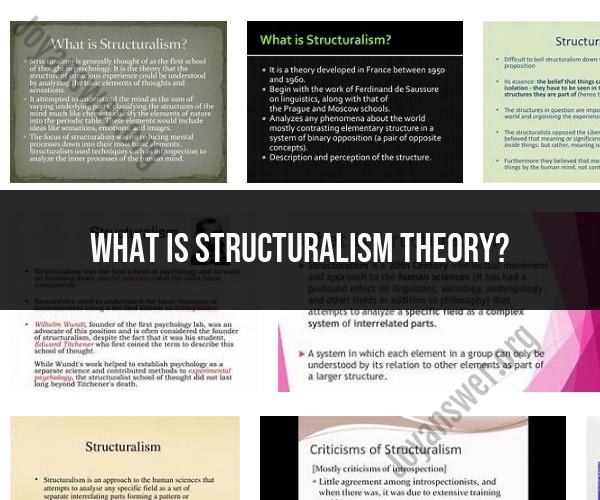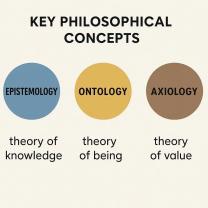What is structuralism theory?
Structuralism is a theoretical framework and approach that emerged in the fields of linguistics, anthropology, psychology, and philosophy in the late 19th and early 20th centuries. It seeks to understand and analyze the underlying structures and systems that govern human behavior, language, culture, and thought. Structuralism is characterized by several key principles:
Focus on Structures: Structuralism emphasizes the study of underlying structures, systems, and patterns that exist within a particular domain of inquiry. These structures are believed to shape and constrain human experiences and behaviors.
Semiotics: Semiotics, the study of signs and symbols and their meanings, is a fundamental component of structuralism. Structuralists examine how signs and symbols function within a given culture or system and how they convey meaning.
Binary Oppositions: Structuralism often relies on the concept of binary oppositions, which involves analyzing phenomena by contrasting pairs of opposing concepts or elements (e.g., good vs. evil, male vs. female, nature vs. culture). This approach helps reveal the underlying structure of meaning.
Language as a Model: In linguistics, structuralism considers language to be a model for understanding other cultural and cognitive systems. It explores the rules, syntax, and phonetics of language to uncover the deep structures of communication.
Anthropology: Structuralism has been influential in anthropology, where it seeks to uncover the underlying structures of cultural practices and rituals. Anthropologists examine how cultural phenomena are interconnected and governed by shared symbolic systems.
Psychology: In psychology, structuralism was influential in the early 20th century, particularly with the work of Wilhelm Wundt and Edward Titchener. They sought to break down conscious experience into its basic components or "structures."
Critiques and Decline: Structuralism has faced criticism for its focus on abstract structures at the expense of individual experiences and historical context. Over time, it gave way to other theoretical approaches, including post-structuralism and deconstruction.
Legacy: Despite its decline as a dominant theoretical approach, structuralism has left a lasting legacy in various fields. It laid the foundation for subsequent developments in linguistics, semiotics, and cultural studies. Additionally, it influenced the development of literary theory and literary criticism.
It's important to note that while structuralism was influential, it is not a unified theory with a single set of doctrines. Different scholars and disciplines applied structuralist principles in various ways and contexts. Additionally, structuralism's prominence waned in the latter half of the 20th century as other theoretical approaches, such as post-structuralism and postmodernism, gained prominence. These later approaches often critiqued and deconstructed the assumptions and methods of structuralism while offering new perspectives on language, culture, and human experience.
Overview and Key Concepts of Structuralism
Structuralism is an intellectual movement that emerged in the mid-20th century and has had a significant impact on a wide range of disciplines, including anthropology, linguistics, literary criticism, and philosophy. Structuralists believe that human culture and society are structured by underlying patterns and relationships. They seek to identify these patterns and relationships in order to understand the meaning and function of cultural phenomena.
Some of the key concepts of structuralism include:
- Structures: Structures are the underlying patterns and relationships that organize human culture and society. They can be found in everything from language and kinship systems to myths and rituals.
- Binary oppositions: Structuralists often use binary oppositions to describe the relationships between elements within a structure. For example, the binary opposition between male and female is often used to organize kinship systems and gender roles.
- Signifier and signified: Structuralists distinguish between the signifier and the signified. The signifier is the physical form of a sign, such as a word or image. The signified is the meaning of the sign. Structuralists argue that the relationship between the signifier and the signified is arbitrary and that meaning is created through the relationships between signs.
Impact of Structuralism on Social Sciences and Linguistics
Structuralism has had a significant impact on the social sciences and linguistics. In anthropology, structuralists such as Claude Lévi-Strauss and Rodney Needham used structural analysis to study kinship systems, myths, and rituals. In linguistics, structuralists such as Ferdinand de Saussure and Roman Jakobson used structural analysis to study the structure of language.
Structuralism has also had an impact on other disciplines, such as literary criticism and philosophy. Structuralist critics have used structural analysis to study the structure and meaning of literary texts. Structuralist philosophers have used structural analysis to study the nature of knowledge and meaning.
Claude Lévi-Strauss and Structural Anthropology
Claude Lévi-Strauss was one of the most influential structuralist anthropologists. He is best known for his work on kinship systems and myths. Lévi-Strauss argued that kinship systems are structured by binary oppositions, such as male and female, and that myths are a way of resolving these contradictions.
Lévi-Strauss's work has been influential in a wide range of disciplines, including anthropology, sociology, psychology, and literary criticism. His work has helped to shed new light on the nature of human culture and society.
Conclusion
Structuralism is a complex and multifaceted intellectual movement. It has had a significant impact on a wide range of disciplines, including anthropology, linguistics, literary criticism, and philosophy. Structuralists have helped us to understand the underlying patterns and relationships that organize human culture and society.













